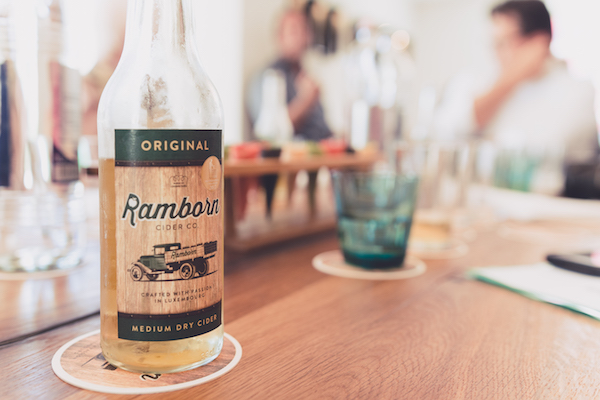
When David Morrell was writing First Blood, the book that spawned the American strongman Rambo films, he says that the name of his hero was inspired by the Rambo apples that his wife brought home one day from the market. A sweet story that somehow makes a fitting backdrop for an apple that sits proudly at the core of a young Luxembourg company whose mission to restore a lost cider-making tradition is showing some serious muscle.
Since its founding in 2015, and first production of just 2,000 bottles, Ramborn Cider Haff has rapidly grown its production — over 150,000 bottles last year — its reputation, its list of highly coveted international awards, and now its outreach with the opening of a dedicated multimedia visitor centre and shop.
In the village of Born which sits on the leafy banks of the River Sûre, Ramborn operates out of a beautifully renovated 18th century farmhouse, with sleek, landscaped gardens neatly dotted with foxglove, hydrangea and lavender that lead towards cool underground cellars, modern production facilities, state-of-the-art visitor centre, and dedicated shop.
Ramborn Cider is a product of its place, the passion of its people, and the sweetness of a long-untapped resource that is woven across Luxembourg’s landscape, and a genuine commitment to integrity. The small, seven-strong team make up the first formal cider producing company in Luxembourg, even though apple wine or viez production has a history that goes back at least as far as Roman times.
The idea was inspired when founder and CEO Carlo Hein and two friends took a trip to Edinburgh where, after sampling some of the more famous local whiskys, they settled on a couple of glasses of cider.
“I didn’t much like it to be honest,” said Hein, reflecting on the moment. But the taste did spark off a train of thought on the orchards that had long formed a backdrop to the friends’ daily lives; orchards whose fruits every year would mostly end up rotting on the ground underneath the branches that bore them.
So they decided to do something about it. But they did more than that. Ramborn is not just about making cider; the company is dedicated to renewing the landscape, of giving fresh life to existing orchards and also planting new ones, while keeping waste and water usage to a minimum. The company engages with local landowners and with their harvest have just one shot at producing the pressed juice that is transformed into their annual output. They don’t use concentrate or industrial production methods, and the pulp created by the pressing process is recycled.
As a result, they benefit from the huge range of varieties that grow naturally across the region which allows them to craft different flavours that are unique reflections of where they come from. It also means that every year will be slightly different from the year before as conditions fluctuate, much like wine.
So far there are four ‘stable’ products including the Original — made with rambo apples and several other traditional varieties — whose medium, crisp flavours and soft sparkle make a refreshing, easy drinker and a perfect opener for anyone who is new to cider-quaffing. The Farmhouse cider is more complex and drier with earthier flavours that would make an excellent pairing with a cheese plate. The Somerset cider blends traditional Luxembourgish apples with the best, tannin-rich apples of Britain’s famed cider-country to produce a vibrant, sparkling, medium dry cider.
There’s also a perry, whose appealing pinkish gold colour whets the appetite before the first sip is taken. This tannin-rich pear drink is drier than its apple counterparts, and would go down extremely well with a rich summer barbecue.
But the brewers at Ramborn are keen experimenters too, producing micro-batches of different ciders based on ideas that take their fancy. Thus, Chronicle also tasted a Hopped cider, reflecting a trend taking off across the Atlantic, where hops are added to impart a floral, herby flavour, creating a cider that isn’t unlike pale ale. A couple of single varieties were also on the table, Kingston Black, a very tasty, smooth, rich and round-flavoured cider with a light sparkle, and a local Erbachhoffer, a variety that has been used for making viez (apple wine) in this region for thousands of years. Crafted by Ramborn, the result is a still, earthy and slightly acid cider.
Ramborn’s mission has taken them down many surprising avenues one feels. Among them, the team took off in late 2015 to explore some of Luxembourg’s forgotten orchards discovering two side by side that between them sport 82 different varieties. So the team at Ramborn did what they do, and produced a special batch of all 82 varieties to create a new cider called Avalon, though we’ll have to wait a little while to taste the results.
In the meantime, a trip to farm, visitor centre and shop in Born to learn about cider’s important history in the region, the process for production from harvest to bottle, and simply to enjoy the beautiful setting is a worthy half-day out. Tours are available between 14:00 and 18:00 on Wednesdays to Saturdays, and cost €10 per person, or €8 per person for groups of eight or more.
The shop features, naturally, Ramborn's own product range, and they also host guest ciders that change each month as well as a range of directly related products.
For more information, including directions, see: www.ramborn.com
Image: © Nicky Sullivan








